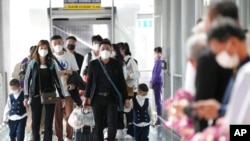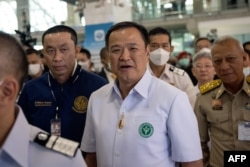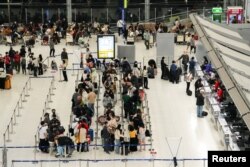Thailand has withdrawn its decision to request COVID-19 vaccine proof from visitors — only days after announcing new rules for all international arrivals.
The Civil Aviation Authority of Thailand on Saturday announced new rules for all international travelers since China dropped its mandatory quarantine requirements and reopened its borders following three years of a strict zero-COVID policy.
But Anutin Charnvirakul, Thailand's health minister, said a panel of health experts agreed to withdraw the new rule because global immunization of the virus was sufficient and that checking for "proof of vaccination" would be "inconvenient," Reuters reported.
The now-scrapped rule had stated all international arrivals to Thailand would have to show proof of at least two COVID-19 vaccinations or a doctor's note of exemption from vaccination or evidence of a recent recovery. Adequate medical insurance, however, is still required if the passenger's next destination requires a pre-entry COVID test.
Reopening of tourism welcome
Thai government officials welcomed Chinese tourists who flew into Thailand from China at Bangkok's Suvarnabhumi airport Monday, the first since Beijing relaxed its pandemic restrictions.
Thailand's economy relies heavily on tourism and returning tourists, especially from China, are a welcome sight for Thai businesses. In 2019, Thailand saw 40 million international arrivals — 11 million were from China alone.
But amid the pandemic-fueled global economic downturn, the kingdom saw a 6% decline in its GDP in 2020.
In 2022, Thailand welcomed more than 11 million tourists, still way below pre-pandemic figures, but enough to contribute to a 2.4% year-on-year rise in Thailand's GDP in the first half of 2022.
Tourism Minister Pipat Ratchakitprakarn said, "we expect Chinese tourists to come to Thailand after Chinese New Year."
Lunar New Year
The Lunar New Year is a major holiday in Asia that begins January 22 this year, and usually sees masses of Chinese tourists travel worldwide. However, Gary Bowerman, a tourism expert based in Kuala Lumpur, said that the resumption of China's outbound travel is expected to be "gradual."
"The primary factor is flights. Because China has heavily restricted its international airspace there are currently very few flights in and out of China, and ticket prices are therefore exceptionally high," Bowerman told VOA. "Airlines will be in discussions with the Civil Aviation of Administration to restore route access, but this may be a gradual process."
China tourism, Thailand forecast
Now that China's reopening has begun, it has prompted Thailand's tourism bureau to increase the forecast for overall arrivals to 25 million for this year. Tourism officials had predicted 18 million to 20 million visitors without the Chinese market but now estimate at least 5 million Chinese visitors are expected to arrive this year.
Bowerman predicts tourism-reliant countries like Thailand shouldn't hold their breath nor expect huge numbers of tourists during the holidays.
"So far, the only clarity of information provided by the Chinese government is related to travel with Hong Kong and Macao. China has said it wants outbound travel to commence in an 'orderly manner' and appears in no hurry to expedite new flight schedules," Bowerman said.
"It looks, at the moment, as if the government wants to optimize domestic travel over the Spring Festival period and evaluate the developing COVID-19 situation. Destinations expecting a surge of Chinese visitors for [Chinese New Year] are likely to be disappointed because it is very unlikely to happen."
Worldwide concerns
With the return of visitors from China, the Tourism Authority of Thailand called for all employees in tourism to get a COVID-19 booster shot.
The potential risk of fast-spreading COVID variants has pushed countries worldwide to impose new requirements for the entry of travelers from China.
The U.S., Australia, Japan, Canada, Britain, France, Italy, Spain, South Korea, Taiwan, India and Malaysia have all imposed various new requirements for visitors, while Morocco has banned Chinese visitors altogether.
But one health expert doesn't see any reason the government should restrict Chinese tourists from visiting Thailand.
Dr. Anan Jongkaewwattana, a virologist and researcher at the National Center for Genetic Engineering and Biotechnology in Thailand, says given the current data, new variants shouldn't be a concern.
"According to data provided by the Chinese authority, the viruses currently circulating in China are mainly BA.5 and its sublineages. Since Thailand experienced a large surge of BA.5 a few months ago, I would expect the Thai population to be mostly immune to this variant," he told VOA via email. "In my opinion, the immunity of the Thai population is high enough to prevent widespread transmission of the older variants from China."
But worries remain in Thailand over the potential of new variants from China with local politicians calling for further restrictions on Chinese tourists.
Chaturon Chaisang, a member of Pheu Thai Party, the main opposition to Thailand's ruling People's Power Party, urged the government to prepare for an influx of Chinese tourists.
"We should have some guards up … and tests should be administered to find out what kind of variants are coming in from China to find out if they are more severe than the variants that have been found in Thailand," The Thai Enquirer reported in December.
But Anan said that Thailand's current policy and available scientific evidence means tourists from China shouldn't be singled out.
"Since Thailand has adopted the policy of 'Living with COVID,' the restriction is not necessary for all tourists coming to the country. I can think of no valid scientific reason to restrict entry of [the] Chinese when there is no evidence that they harbor more harmful viruses than people from other countries," he said.









